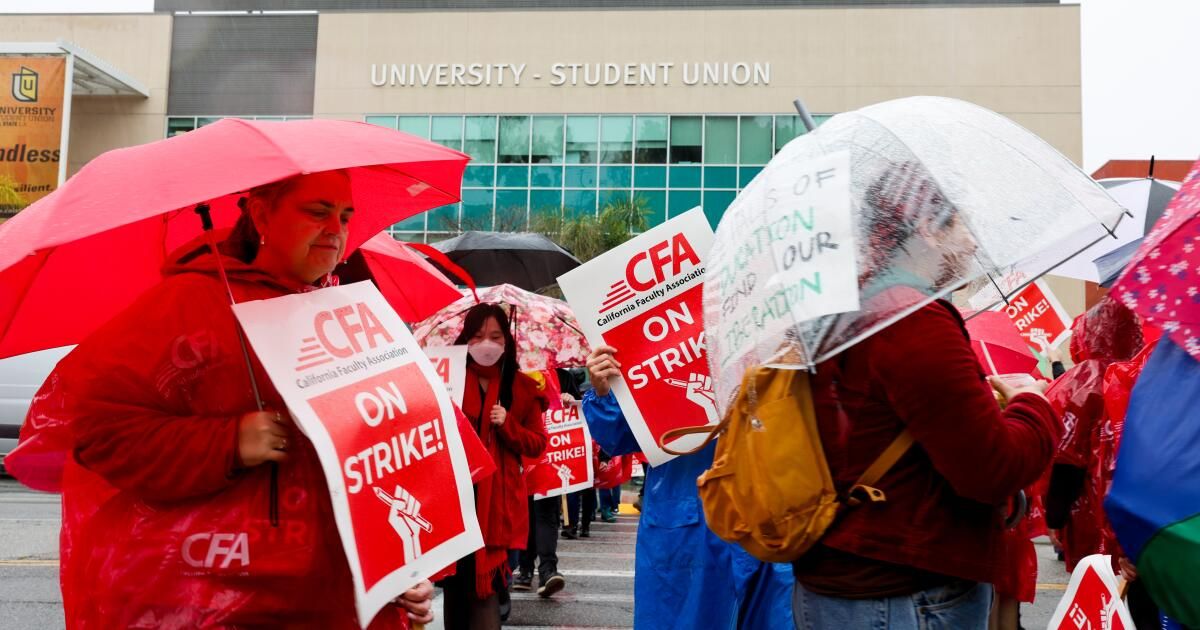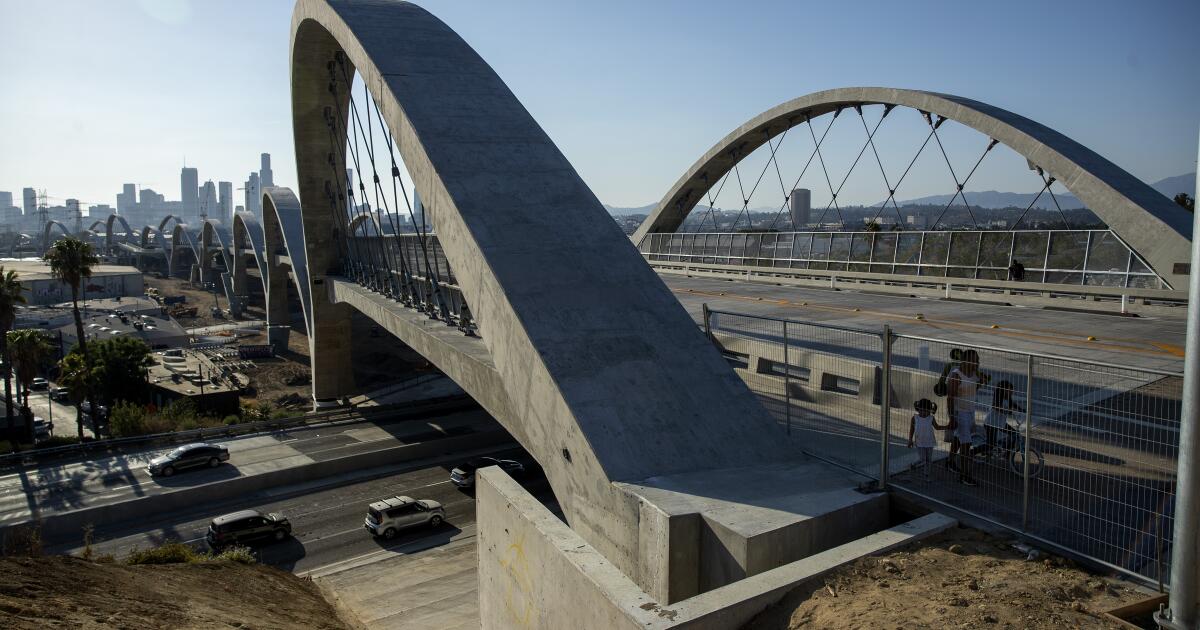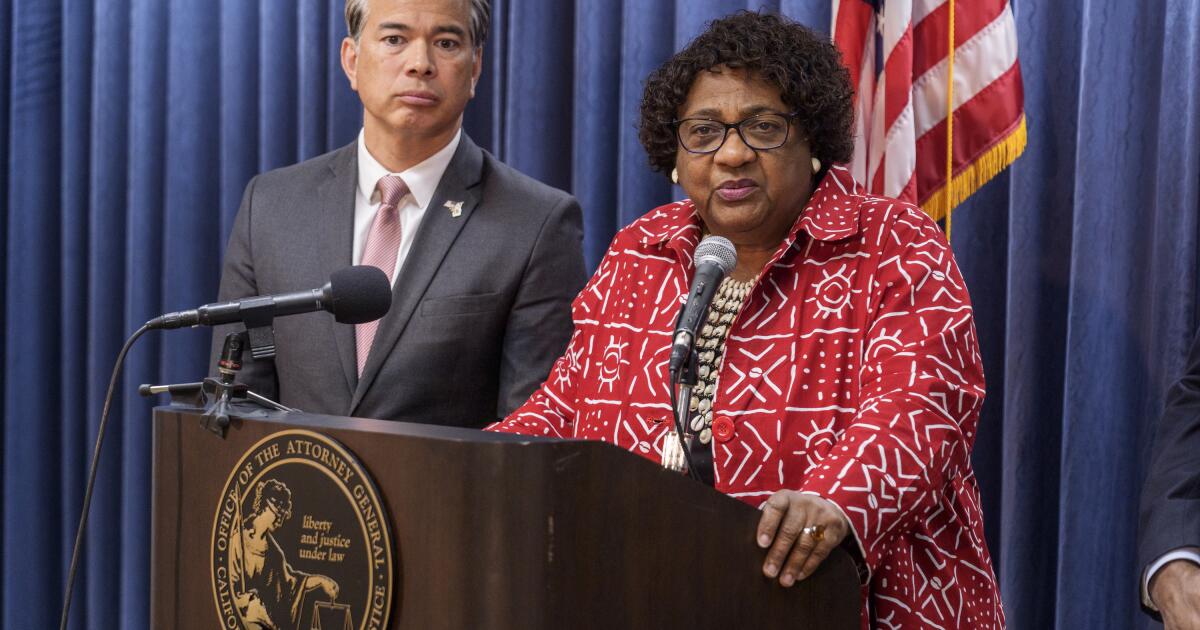The union representing California State University faculty reached a tentative agreement with the university system Monday night, ending a planned five-day strike after one day.
“In case anyone forgot, STRIKES WORK! After months of negotiations and two strikes, our movement for a #betterCSU has borne fruit!” the union announced on Instagram.
Professors are expected to resume teaching on Tuesday and students have been advised to check for messages from their instructors. The agreement, which must be ratified by union members, includes higher minimum wages for the lowest paid workers, safer workplaces and an extension of parental leave. In an email to faculty members, union leaders said the agreement includes a 5% salary increase retroactive to July 1, 2023, among other benefits.
“I am extremely pleased and deeply grateful that we have reached an agreement with the CFA that will end the strike immediately,” CSU Chancellor Mildred Garcia said in a statement. “The agreement allows CSU to fairly compensate its valued world-class faculty, while protecting the long-term financial sustainability of the university system.”
The unexpected announcement came after faculty at all 23 campuses of CSU, the nation's largest four-year university system, staged a mass walkout on Monday, the first day of the semester for most students.
As teachers marched in a cold rain across much of the state, students followed a dizzying mix of instructions: classes are canceled, classes are temporarily on Zoom, class is in session; Assignments are online, assignments are removed for a week. Official email communication with teachers was cut off, leaving some unaware if classes were taking place.
Neither university administrators nor the union had an official count of the number of closed classrooms. But students across the system said teachers did not attend most, if not all, of their classes.
The university said it did not cancel classes and clarified what it called “misinformation” about the status of instruction.
“Classes are not cancelled. Individual faculty members who decide to strike will cancel their own classes,” a message on Monday said. “If students have not received word from their instructor that their class has been canceled, they should assume that it is proceeding as scheduled and go to class.”
The message said the two sides were “in communication over the weekend,” but did not share details.
The strike by the California Faculty Association, which represents 29,000 teachers, counselors, librarians and coaches, capped months of growing tension between the union and the CSU administration. It was California's latest strike in higher education and TK-12 school districts, as teachers and other workers — many of them stressed or burned out after years of the pandemic — have demanded higher salaries amid the increasing cost of living.
Just over a year ago, about 48,000 University of California academic workers, teaching assistants, researchers and postdoctoral scholars walked out for about five weeks, ultimately achieving significant improvements in wages and working conditions. The Los Angeles Unified School District closed for three days in March 2023, when teachers walked off the job in solidarity with school support staff, who got pay raises. A month later, Los Angeles teachers agreed to a contract that provides for a 21% pay increase over about three years, avoiding a second strike.
Union demands
The CSU faculty union had pushed for a 12% across-the-board salary increase for the 2023-24 academic year and wanted to raise the minimum salary for full-time faculty to $64,360 from $54,360. The union also sought improvements such as smaller classes, gender-inclusive bathrooms and a full semester of expanded parental leave.
The provisional agreement does not cover the full list of demands. In addition to retroactive pay, the agreement includes another 5% increase on July 1 that is dependent on state funding. It raises the minimum teacher salary by $3,000, increases paid parental leave from six to 10 weeks, and improves access to gender-inclusive bathrooms and lactation spaces, according to the email.
It also extends the current contract, which was due to end in June, for one year.
“This historic agreement was won through member solidarity, collective action, bravery and love for each other and for our students,” Antonio Gallo, associate vice president for faculty, said in the email. “This is what People Power looks like. “This agreement greatly improves the working conditions of teachers and strengthens the learning conditions of students.”
Scenes on campus
The one-day strike left CSU campuses nearly empty.
About a dozen people remained in the Cal State LA student union in the morning, while faculty members in red ponchos picketed outside. The normally packed Starbucks on campus was devoid of customers.
“Normally the line would be out the door,” said Jordyn O'Connell, a student who works as a barista.
All of O'Connell's classes had been canceled due to the strike. The 20-year-old psychology student supported the strike, but she hoped to resume classes after winter break.
“I really wanted to come back,” he said. “I just hope we work this out. “I’m ready to start the semester.”
For some students, it was unclear which classes were canceled. Moments before heading to the Cal State Fullerton student center on Monday, arts student Leslie Segundo learned that a professor who was scheduled to teach one of her classes had moved the start date to next week because of the strike. .
Second he hadn't heard from all of his professors and assumed that those who hadn't emailed him were going to teach classes.
“I will attend the classes that are available,” said Segundo, who commutes to campus from Orange. “As for the teachers who are on strike, they have not sent me emails with clear details about it. “I don’t think I was assigned any reading.”
Around lunchtime, Karen Carrillo, president of Associated Students Inc. at Fresno State University, said there wasn't the typical crowding at the campus food court. Three of her five teachers canceled classes this week, a move she supported.
“We're still learning, even if it's not in the classroom,” Carrillo said. “We are learning from teachers how to lead by example and how to fight for what they believe is right.”
Michael Lee-Chang, a sophomore at Sacramento State University, said the campus looked like a ghost town. A friend sent him a photo of a class in progress; The only people in the room were the student and the teacher. Lee-Chang said he feels the majority of students support the strike.
Cal State officials had distributed forms online, asking students to report canceled classes. Lee-Chang said many were reluctant to “snitch on their teachers, because they are teachers they know and care about.” Some students filled out spam forms, reporting the status of fictitious classes like “Evil 101.”
The rain didn't stop Stevie Ruiz, a Cal State Northridge professor in the Chicano and Chicano studies department, from protesting. She said the vast majority of students were staying away from campus. Ruiz added that about half of Northridge's student body is Latino and many are the first in their families to attend college.
“This is a struggle of the working class. We are really surprised by the great support from the students. “What happens to us affects them,” he stated. “They care about us and we care about them.”












